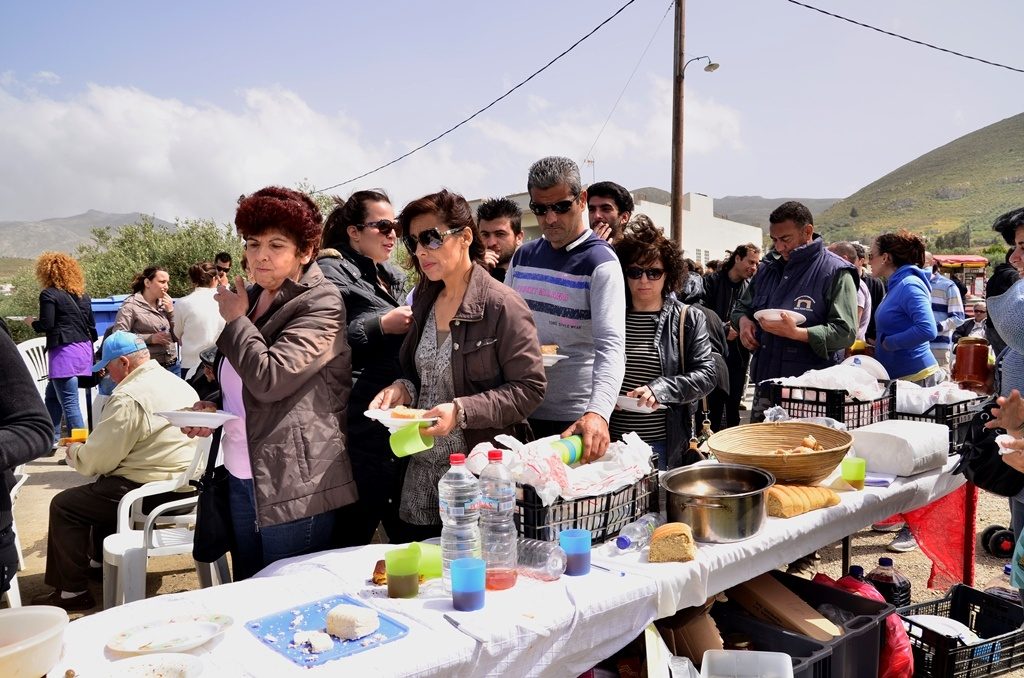
- HOME
- REGION
- FLAVOURS
- NATURE
- CULTURE
- HISTORY
- CRETE IN THE NEOLITHIC PERIOD
- CRETE IN THE MINOAN PERIOD
- FROM THE SUB-MINOAN TO THE HELLENISTIC PERIOD
- THE ROMAN PERIOD
- THE ARAB PERIOD
- EARLY CHRISTIAN AND FIRST BYZANTINE PERIOD
- SECOND BYZANTINE PERIOD (961-1204 A.D.)
- VENETIAN RULE (1211-1669 A.D.)
- THE INDEPENDENCE OF CRETE AND ITS UNION WITH GREECE
- THE WORLD WAR AND OCCUPATION – RECENT PAST AND PRESENT
- MUSICAL TRADITION
- HISTORY
- ACCESS TO HOUDETSI
- Gallery
- ACTIVITIES
- Contact
CELEBRATING TASTE
Major religious festivals and life events are associated with specific and, usually, complicated, dishes.
At Christmas, after the long fasting period, meat, pork in particular, is a major player on the festive table. Housewives also prepare Christmas breads, called Christopsoma or Stavropsoma (Christ’s breads of Cross breads) famous for their elaborate decoration and the special motifs used, different for each locality. For New Year’s Day they prepare kourambiedes (a type of shortbread covered in icing sugar), melomakarona (small biscuit-like sweets sprinkled with walnuts and diluted honey) and the vasilopita (a special cake or pie containing the ‘lucky coin’). In different places different sweets are prepared, such as methysmena koulourakia (literally: drunk cookies, made with wine) in Merabelo, xerotigana (honey-dipped spiral pastries) in Ierapetra, etc. On the eve of Epiphany the dish of the day is palikaria (a dish made with various legumes and cereal grains, such as lentils, chick peas, beans, broad beans and wheat); during Carnival they make agnopites (literally: purity pies, a type of cheese pie) and tzoulamas (pie filled with chicken livers, raisins and nuts), at Easter they cook lamb, mageiritsa (a soup made with lamb offal) and avgokouloures or lambrokouloures (sweet round bread loaves, literally: egg-loops or Easter loops) as well as kalitsounia (small pies filled with cheese or herbs).
At social events, such as weddings or christenings, as well as at religious feasts, the main dish is pilaf, while special bread loaves are also prepared, decorated with exceptional skill and artistry, the famous gamokouloura or xobliasta psomia (literally: wedding bread loaves or ‘embroidered’ bread loaves). Furthermore, xerotigana (honey-dipped spiral pastries) as well as amygdalota (marzipan sweets) are offered at weddings and at other important social events. The drink offered at weddings is soumada (a drink made with almond ‘milk’) along with plenty of local varieties of wine.
- Kazanemata (kazani is the distillation vat): In the autumn, raki distillation is a non-stop feast from one end of Crete to the other; it is known as ‘kazanemata’. Raki is a special drink, full and exuberant, born from the remnants of grapes. This drink has two to three times the alcohol content of wine (20-30%). The strongest raki is that produced the first 10-15 minutes of each ‘kazania’ (vatful) and it is called protoraki (first/top raki). If you visit Crete in November, when kazanemata starts, go to Agies Paraskies, Komes, Houdetsi and elsewhere, to taste the tsikoudia (another name for raki); the drink flows freely at distillation plants during local feasts, accompanied by music and delicacies. Raki production is not just a process, particularly for this Municipality. It is a feast, an opportunity for socialising, for singing and dancing, which starts early in the evening and ends the following morning.
- The Watermelon Festival: At Charakas, Heraklion, they hold the Watermelon Festival every summer; it is accompanied by Cretan music & dance troupe performances.
- Koures (Sheep shearing): This is one of the most impressive feasts and takes place at the end of spring at the mitata (plural of mitato, stone huts on mountain peaks) of the Asterousia mountain range; every animal farmer invites friends and relatives to help with the shearing, which is followed by feasting with food and drink, music and dancing.
- Kakavia (fish soup, a type of Bouillabaisse) Feast: In the summer, around August, ask about the famous feast held at Treis Ekklisies (Literally: Three Churches), accompanied by music and dancing.
source: archanes-asterousia.g
